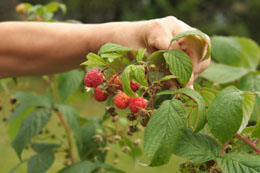Raspberries are popular fruits due to their many health benefits, and they are quite easy to grow too. This article will give you detailed information on growing and pruning raspberry plants for the successful cultivation of its fruits.

Raspberry is a nutritious fruit that belongs to the genus
Rubus of the rose family. It is of high nutritional value, since it is rich in vitamin C, iron, and folate. It does not contain any fat, cholesterol, or sodium. There are basically two species of this plant, viz., red raspberry (
Rubus idaeus) and black raspberry (
Rubus occidentalis). Both these varieties are commercially grown all over the world.
Raspberry is a perennial, thorny shrub with woody stems that produces shoots from the ground, which are known as canes. The plant is either erect, semi-erect, or trailing. It bears palmately compound leaves with 3-5 leaflets, the one in the middle being the largest. Flowers of this plant are small (1 cm in diameter), white or pink in color, and are borne either singly or in groups. The plant bears fruits in the second year of plantation. These fruits are aggregates of small, individual drupelets. Here are some useful tips on how to grow and prune raspberry plants.
Growing Raspberry Plants
This plant can be grown in vegetable gardens or greenhouses. In terms of fruit bearing, there are two types of this plant, namely June-bearing and fall-bearing. The former crop, as the name suggests, bears fruit in June or July, whereas the latter variation is everbearing and bears two harvests per season. For better crop yield, it is important that the fruits are not exposed to extremes of climate. Besides this, if the soil is too wet, the fruits are susceptible to fungal infections. Keeping this in mind, many cultivators prefer crop cultivation during spring or summer.
Based on the location, choose the appropriate variety of raspberry and purchase the plantlets. Make sure to select disease- and pest-resistant varieties. Prepare the soil bed in early autumn for plantation, as you do for other crops. Raspberry can thrive well in any type of soil (either sandy or loamy), provided that there is a proper drainage system and the soil pH is in the range of 5.5-7, i.e., the soil is slightly acidic. Grow the plantlets at an average depth, leaving a space of about 8-16 feet between two plantlets.
Water the plants regularly, as they have a shallow-root system and are less tolerant to drought conditions. Raspberry canes are biennial, which means they survive for only two years. The canes developed in the first year of plantation are vegetative, i.e., they bear only leaves and are called primocanes. As the primocanes flower in the next year, they are referred to as floricanes, which eventually bear fruits. The plants can be easily propagated by using a variety of techniques after you successfully grow the first crop.
Pruning Them
For proper maintenance of the raspberry plants, it is advisable to prune them to a manageable size using sharp gardening tools. While doing so, it is advisable to wear thick gloves, so as to protect your hands from thorns. Pruning is done twice a year, in the late winter or early spring and then in summer.
In the first pruning, remove all the canes that already bore fruit, as they will not fruit again. You can recognize these canes by their thin and brownish barks. Make sure that there are only 4-5 healthy and sturdy canes per foot in the row. You can also prune the short canes as well as those that are growing outside the row. Everbearing canes can be made to fruit only once in a season by pruning the canes in early spring. This way, you can achieve a good fall harvest. The second, i.e., summer pruning is done to remove dead and diseased canes. You can also prune canes that are expanding outside the row.
For weed control, you can plant ground covers such as rye, millet, oat, and buckwheat. These will also enrich the soil with organic matter. Speaking about the fertilizers, you can supplement the soil with organic compost and farmyard manure. By following these basic tips on growing and pruning, enjoy a good harvest of flavorful raspberry fruits.






 Raspberry is a nutritious fruit that belongs to the genus Rubus of the rose family. It is of high nutritional value, since it is rich in vitamin C, iron, and folate. It does not contain any fat, cholesterol, or sodium. There are basically two species of this plant, viz., red raspberry (Rubus idaeus) and black raspberry (Rubus occidentalis). Both these varieties are commercially grown all over the world.
Raspberry is a nutritious fruit that belongs to the genus Rubus of the rose family. It is of high nutritional value, since it is rich in vitamin C, iron, and folate. It does not contain any fat, cholesterol, or sodium. There are basically two species of this plant, viz., red raspberry (Rubus idaeus) and black raspberry (Rubus occidentalis). Both these varieties are commercially grown all over the world.